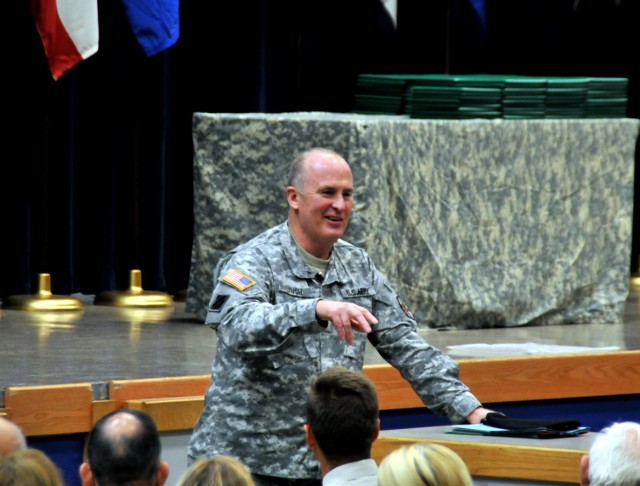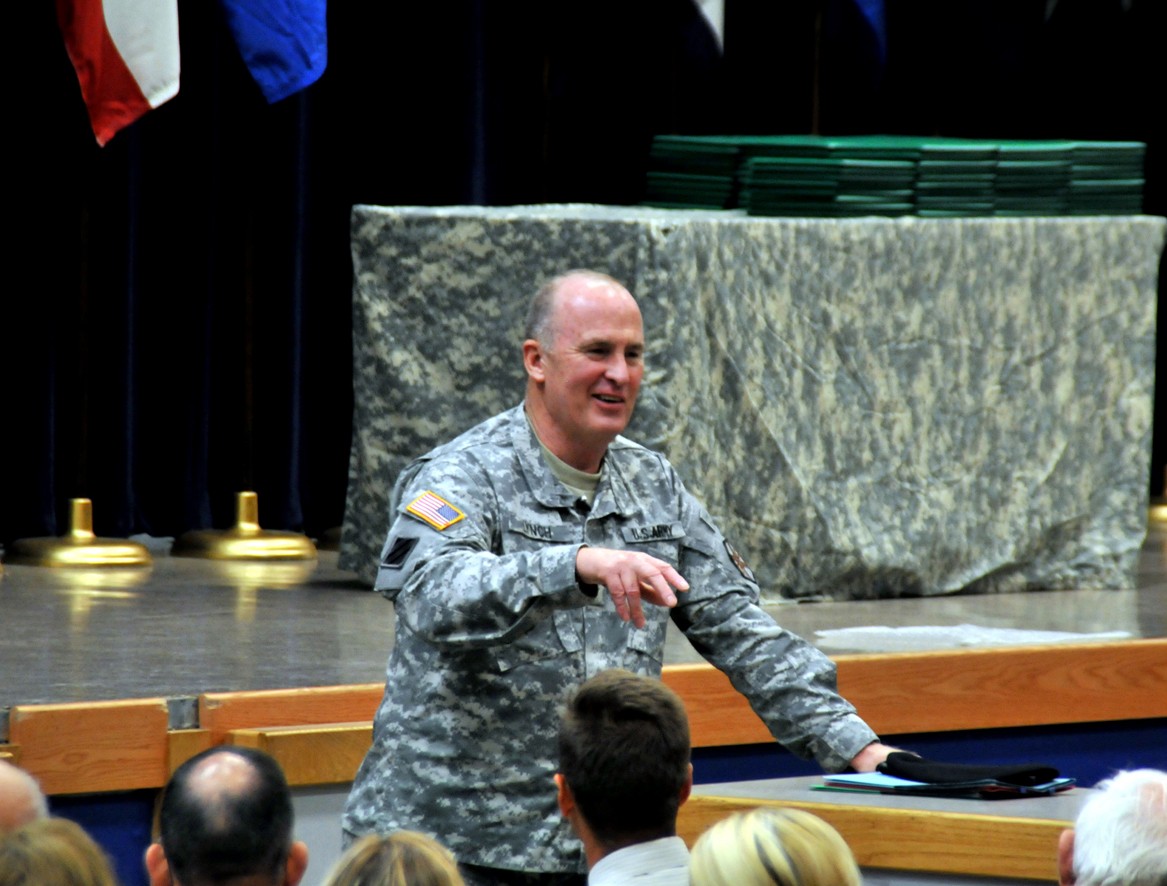FORT DRUM, N.Y. -- The lieutenant general in charge of all Army civilian employees for Installation Management Command held a town hall meeting at Fort Drum last week to commend the efforts of the workforce and to offer a look into the man behind the three stars.
"I want to tell you who I am," began Lt. Gen. Rick Lynch, commanding general of IMCOM, whose wife accompanied him on the visit. "And who I am is Sarah's husband.
"Even the president of the United States," he said, "who some people might consider the most important person in the world, is only the president for four or eight years. But he's always the husband of his wife and the father of his children. That's where the priority has to be."
After an Army career spanning three decades, Lynch became IMCOM's second commanding general last October.
He said he didn't even know the Army had 163 installations until he assumed his new position.
"I thought the Army had Fort Stewart and Fort Hood," he said to laughter from the audience. "But I realized the Army's actually bigger than that."
Lynch told the hundreds gathered that he was proud of the work they are doing at Fort Drum for Soldiers, Families and civilians.
He even classified the garrison's efforts as more crucial than his own.
"You got to know this about me - I don't think I am important at all," he said. "I still find it to be uncomfortable to walk into a room and (to see) people stand up. Everybody in this room is as important to IMCOM or, candidly, more important to IMCOM than I am, the regional director is or the garrison commander is."
"The essence of IMCOM is not me ... the essence of IMCOM is you," he said. "I don't know you, but I know what you've been accomplishing at Fort Drum. It's nothing short of spectacular. You truly are setting the standard across the Army."
Col. Kenneth Riddle, Fort Drum garrison commander for the past two and a half years, also took a moment at the town hall to express gratitude as the leader of the post's workforce.
"There's been no more rewarding job than this in my 25 years of service," said Riddle, a day before his change of command ceremony. "It is just that kind of job; you see the changes you make. But it's time to move on."
Riddle said IMCOM's commanding general is someone who likes to get out, walk the installations and find out what "ground truth is" - by talking to Soldiers, Families and the workforce.
"That's our kind of commanding general," Riddle said.
IMCOM employs 120,000 people on a $28 billion annual budget. It was formed four years ago to standardize all installation services for an Army persistently at war.
Lynch noted that a depth in Army formations is what allows one leader to be easily replaced by the next. But he said that doesn't stop him from taking his work very seriously.
"There's not a job in the world that has more of a direct influence on our Soldiers, our civilians and their Families than this job - not a job in the world," he said.
But to be successful at his job requires cooperation from the workforce, in the form of feedback, he said.
"My biggest frustration nine months in as commander of IMCOM is I can't get the workforce to talk to me," Lynch said. "You know where the points of friction are. You know what we need to be doing differently. You know when you're short of resources. You know when you're having problems. We know we can work to fix it. If we don't know, we can't fix it.
"What I implore you to do is to give me your feedback," he said, giving out his direct e-mail address. "How are we doing' Just e-mail me. I need your feedback. That's just so so important. Help us with that."
Lynch said what came through "loud and clear" when he first took command at IMCOM was that there was no clear vision and strategy for a way forward.
"What we had was a whole bunch of random activity with people just wandering around doing what they thought was important," he said.
Lynch's transition team published a campaign plan within six months; a second version of that plan will be released Oct. 5, he said.
"I want you to know that together, we are making history," he said. "Everything I'm seeing, I see traces of your efforts, because you are making a difference. You are touching people's lives. It's not just a job, it's a profession.
"It's a passion," he continued. "You're taking care of our Soldiers, our civilians and their Families. Nobody does it better. I'm proud of you. I'm proud of what you do every day. I'm proud of your directors, and I'm proud of the garrison commander.
"I'm leaving Fort Drum uplifted," he added. "From the time I got here yesterday, until the time I get on a plane in a couple of hours, it's been nothing but magnificent."
Sarah Lynch, who often visits installations along with her husband, enjoys mingling with Family Members and employees to give the general a sense of the garrison's morale and welfare, Lynch said.
"Last night, she couldn't stop talking about the great things here at Fort Drum, because of what you all here are doing," the commander said. "You got to be proud of that."
Later in the meeting, Sarah Lynch stood up and offered the workforce an emotional show of gratitude.
"What I want all of you to know is how very very important you are," she said. "You make our lives bearable during these times. Not bearable just once, but bearable time and time and time again. I just want to thank you so much, from the bottom of my heart, for what you do."
The many programs offered by IMCOM help alleviate the stresses and anxieties the Army places on Families, Lynch said, adding that nobody should be ashamed of seeking help for emotional suffering.
"If you need help, get help," he said. "I've cried more in the last four years than I've cried in my entire adult life. You cannot go through what we're going through as an Army and not be affected.
"I start every day in prayer," he continued. "Next to my Bible in my office at the Pentagon are 153 laminated cards with the faces of the fallen - those 153 Soldiers who died in a place on the battlefield (in Iraq) that I placed them. As I told you, I've got to live with that the rest of my life. But I spread them out every day and I look at them, and I think about them. I pray for them, and I pray for their Families.
"If you love somebody, tell them you love them," he finished. "If they're close by, give them a hug. If they're not, give them a call, and tell them you love them ... just like I love you."
Since taking command, Lynch has launched several campaigns, including "Stamp Out Stupid" and his three-fundamental-questions rule: "Are we doing the right things' Are we doing things right' What are we missing'" His columns regularly appear in The Mountaineer, addressing such topics as energy, community outreach and the Army Family Covenant.


Social Sharing